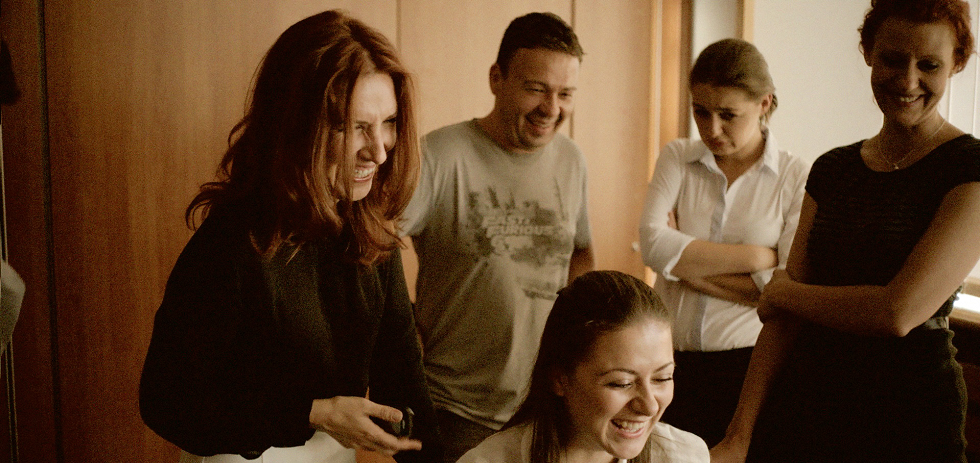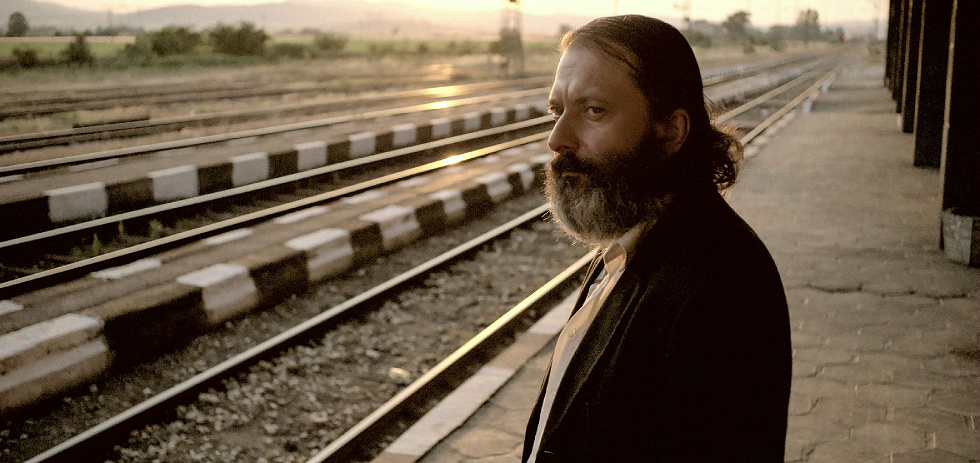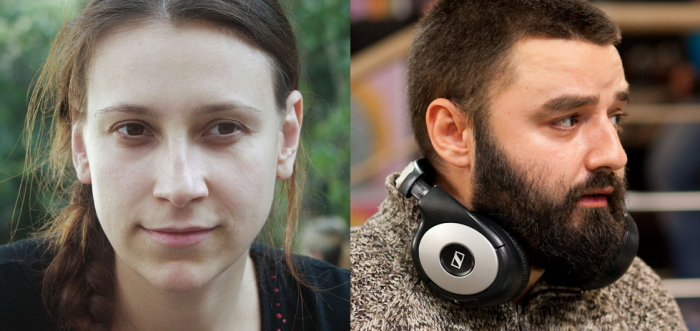Kristina Grozeva and Petar Valchanov’s work as co-directors has spanned a series of short films, and continues with Slava (Glory), the second instalment of a trilogy of features beginning with 2014’s The Lesson. Grozeva and Valchanov’s latest is a refreshing take on a dark comedy, defined by a subtle tension and an absence of cliché. With a distinct visual palette, the two have continued to establish themselves as a talented, politically insightful, and cinematically adept pair of directors. We caught up with Grozeva and Valchanov at Locarno Film Festival to discuss their approach to writing, directing as a duo, and articulating a clear message in their work.
I wanted to open by asking about your previous film—Urok, or The Lesson. It had quite similar themes centred around class, desperation and inequality in subtle sort of ways. At the same time, I thought that Slava was a broader kind of a movie. As in, it was clear that those social-political kind of themes were there, even if they weren’t the core of the film. Are these particular topics that you’re interested in, or something that becomes inherent in your films?
Kristina Grozeva: Yeah, we are interested in these social themes; themes about the relationship between people. We like to make say … human films, for human beings, that show how these human beings exist in the reality; whether a political or maybe another other reality, or …
Petar Valchanov: Social.
KG: Yes, a social reality, focusing on how they are dealing with all these things which happened to them.
PV: The idea that The Lesson and Slava embody is… The Lesson is the first film of three, Slava is the second one. The inspiration came from a newspaper titles. That’s the base of this; there is a social element that is built in both stories, and there will be in the third one.
In that Urok is based on real events … are you saying that Slava is kind of similar?
PV: Yes, yes. It was the real event. It happened many years ago. It was one real railway worker who found millions on tracks, and he gave it back to a group of police officers. Later, the Ministry of Transport … they gave him a new work watch.
A new watch?
PV: Yeah, a new watch. It also stopped working after two weeks, which is where our story starts from, yes, this point.
Right. I was interested in how Tsanko was portrayed—
PV: Just second movie, we changed a bit of it because …
KG: Yeah. We were told to vary but it is …
Yeah, I though that the way in which … I’m not sure if it was intentional but I kind of felt like over the course of the film, almost ever single character became more involved in their own kind of objectives at the expense of everyone else. My friend who I was with, we both loved how the characters were designed. I was wondering whether they were very based in truth or how you kind of worked on writing them?
KG: We just take the superficial parts of the stories we find. The superficial level of the story, of the plot, or of the idea from the real life. After that we create, we imagine, and yes, we make the details, not from the real prototype, but how to say … from many other things.
PV: Yes. For example, there was one story with one architect from Bulgaria who has a kind of situation like this. In our film there is a part where our hero has to apologize to the minister. This is inspired from the story we read about the architect—
KG: … the other true story.
PV: … the other true story that we combined.
Ah, all right. Who had to apologise?
PV: It was an idea for the third film, actually, but in one moment we built it into this one. Behind any character, there is some prototype that we have. For example, the journalist—we had an idea for him from real events. The plot and the structure we created, they’re not based on the real story. It’s just inspired from these moments with the money, with the fake watch. After we constructed our story. We take a lot of references, but it’s something that we constructed, we build it. It’s like our previous film, The Lesson. The character of the students and the kids, it’s our, I would say our own lives there.
KG: Yeah. We tried that. We tried to build complex characters. This is very important to us, and even most of the time we talk, we deduct or send. They help us survey a lot of things, because we invent the freedom to be our … how to say … co-writers, or co-creators. We together built the characters; putting in it an real element from the real life.

I guess one of the most interesting characters in the film is obviously like Julie. I was interested in when you are working with such a fantastic actress. Do you build a character like her out of the process of shooting with the actress like back and forth or is it, did you have a set script already before you went into that process?
KG: As I told, we give many freedom to the actors. In this case, it was the same, but she was very well-prepared because she, the actress who played her went to the office of Plevneliev, the Bulgarian president, and worked there for a couple of weeks. She could then take the spirit of this kind of team, and I think that this was very helpful for our process.
I was curious as to how that relationship between the two of you has functioned as co-directors, working together for quite a while now—making two features, the documentary and shorts together; how has that continued throughout most of your creative careers in filmmaking?
PV: Yes. We enjoy it, we have fun working together, and we plan to continue this way. If we find a third one, why not?
KG: Yes, why not?
PV: If it’s worked for the film, why not?
KG: We are open.
PV: We are open. Yes, we are not from this kind of thinking where the director is the main role and his work is the main work. We are open when we are working with the actors. This time we worked in Slava with a third person in the writing process.
KG: We had co-writer this time.
PV: He had some small role in the film, he played a part of the PR group. Yes, but we enjoy working like this because we are feeling more open, more …
KG: Comfortable and creative.
PV: … comfortable and more creative, yes.
KG: When we work together.
PV: Yes. Of course, sometimes we work for some let’s say TV series. We can work in separate but it’s not the same. It’s not the same.

Wrapping up, I wanted to know where you see this sitting as a final product, once the trilogy is complete. Where do you see the third part going, have you figured that out yet?
KG: I mentioned in our press conference before that now, we are looking for the third story… for this, we have to read a lot of papers.
PV: Newspapers.
KG: Newspapers, yes. Yeah, we have some ideas still, but we are in the beginning of the process.
PV: Because now we have one other project that we are working on, but it’s out of this trilogy. Another story that we started to develop it like some of the cinema in this program, as a low budget film. Maybe in the Spring or in the Autumn, we will start to shoot it. Still, we are looking for financing there. At the same time, we’re try to choose because there are a lot of interesting stories that we have in mind. Maybe we need this time to choose stories that are more close to our own time … because this with railway work, it happened in 2002 or 2001.
Right—
PV: It was a lot of time that this.
Yeah. I feel like it’s a lot it’s probably changed as well in the last 15 years or so. I’m excited to see where you go with the third film, because I really enjoyed Slava. Is this the world or international premiere?
PV: World.
KG: World.
It hasn’t screened yet in Bulgaria at all?
KG: Yeah.
PV: No. It will have screening in the Autumn now, at a national festival. We know that our film …
KG: This is the very, very …
PV: Yes, very, very first premiere.
KG: … first time.
PV: We are also hearing that our film will be distributed in Australia.
Whoa, that’s fantastic. Is it going to screen at a festival or is it—
PV: We have a distribution company.
That’s great!
PV: Yes, for Australia. I didn’t remember the name. Through our sales company, we received the good news from them that in Australia there is a company who will.
KG: Which is great.
That’s really exciting!
PV: Yes yes, it’s great.
I really enjoyed the film. I’ve seen three or four of the competition now, and it’s one of my favourites. Thanks for the interview.
PV: Thanks!
KG: Thank you.
